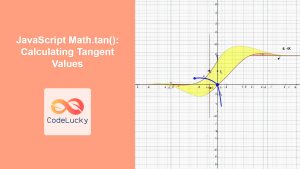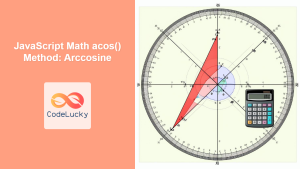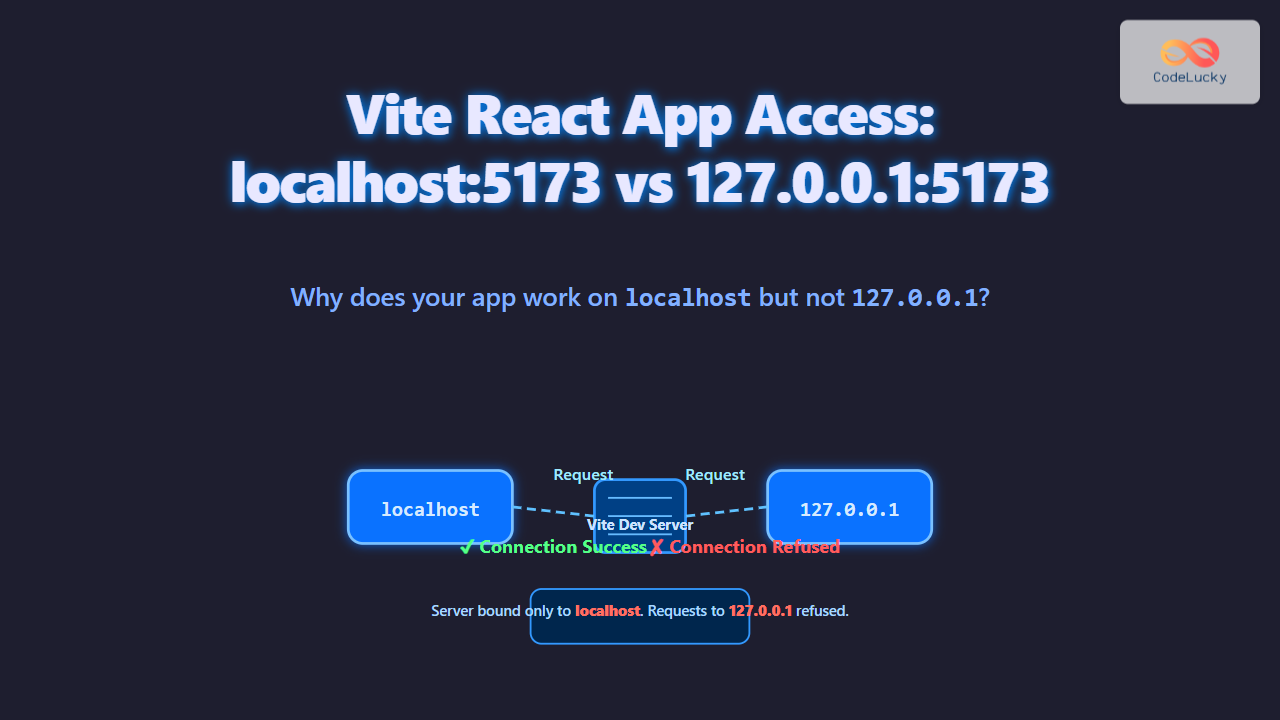JavaScript Math.tanh() Method: Hyperbolic Tangent
The Math.tanh() method in JavaScript is a built-in function that returns the hyperbolic tangent of a number. Hyperbolic functions are counterparts to the trigonometric functions, but use hyperbolas instead of circles. The hyperbolic tangent function is defined as sinh(x) / cosh(x), where sinh(x) is the hyperbolic sine and cosh(x) is the hyperbolic cosine.
Purpose of Math.tanh()
The primary purpose of Math.tanh() is to calculate the hyperbolic tangent of a given number. This function is useful in various mathematical and scientific computations, particularly in fields like physics, engineering, and machine learning.
Syntax
The syntax for the Math.tanh() method is straightforward:
Math.tanh(x)
Where:
x: A number representing the angle in radians for which you want to find the hyperbolic tangent.
Return Value
The Math.tanh() method returns the hyperbolic tangent of the given number. The return value will always be between -1 and 1.
Examples
Let’s explore some examples to understand how Math.tanh() works in practice.
Basic Usage
const num1 = 0;
const result1 = Math.tanh(num1);
console.log(`The hyperbolic tangent of ${num1} is ${result1}`); // Output: The hyperbolic tangent of 0 is 0
const num2 = 1;
const result2 = Math.tanh(num2);
console.log(`The hyperbolic tangent of ${num2} is ${result2}`); // Output: The hyperbolic tangent of 1 is 0.7615941559557649
const num3 = -1;
const result3 = Math.tanh(num3);
console.log(`The hyperbolic tangent of ${num3} is ${result3}`); // Output: The hyperbolic tangent of -1 is -0.7615941559557649
Using Math.tanh() with Different Numbers
const num4 = Infinity;
const result4 = Math.tanh(num4);
console.log(`The hyperbolic tangent of ${num4} is ${result4}`); // Output: The hyperbolic tangent of Infinity is 1
const num5 = -Infinity;
const result5 = Math.tanh(num5);
console.log(`The hyperbolic tangent of ${num5} is ${result5}`); // Output: The hyperbolic tangent of -Infinity is -1
const num6 = NaN;
const result6 = Math.tanh(num6);
console.log(`The hyperbolic tangent of ${num6} is ${result6}`); // Output: The hyperbolic tangent of NaN is NaN
Applying Math.tanh() to an Array of Numbers
const numbers = [-2, -1, 0, 1, 2];
const tanhValues = numbers.map(Math.tanh);
console.log("Hyperbolic tangents:", tanhValues);
// Output: Hyperbolic tangents: [ -0.9640275800758169, -0.7615941559557649, 0, 0.7615941559557649, 0.9640275800758169 ]
Real-World Applications of Math.tanh()
The Math.tanh() method is used in various fields and applications. Here are a few examples:
Neural Networks
In neural networks, the hyperbolic tangent function is often used as an activation function for neurons. It helps introduce non-linearity into the network, allowing it to learn complex patterns.
function hyperbolicTangentActivation(x) {
return Math.tanh(x);
}
const input = 0.5;
const output = hyperbolicTangentActivation(input);
console.log(`The hyperbolic tangent activation for ${input} is ${output}`); // Output: The hyperbolic tangent activation for 0.5 is 0.46211715726000974
Physics and Engineering
Hyperbolic functions are used in physics and engineering to describe various phenomena, such as the shape of a hanging cable (catenary) and the velocity distribution in fluid dynamics.
function velocityDistribution(y) {
// Simplified example: tanh used in velocity profile calculations
return 10 * Math.tanh(y / 5);
}
const distance = 2;
const velocity = velocityDistribution(distance);
console.log(`Velocity at distance ${distance} is ${velocity}`); // Output: Velocity at distance 2 is 3.812781533642691
Data Normalization
Math.tanh() can be used to normalize data between -1 and 1, which is useful in machine learning and data analysis tasks.
function normalizeData(value, min, max) {
const normalizedValue = 2 * ((value - min) / (max - min)) - 1;
return Math.tanh(normalizedValue);
}
const dataValue = 75;
const minValue = 0;
const maxValue = 100;
const normalized = normalizeData(dataValue, minValue, maxValue);
console.log(`Normalized value: ${normalized}`); // Output: Normalized value: 0.6351489523809655
Drawing a Hyperbolic Tangent Curve on Canvas
Here’s an example of how to draw a hyperbolic tangent curve on an HTML canvas using Math.tanh().
<!DOCTYPE html>
<html>
<head>
<title>Math.tanh() Canvas Example</title>
</head>
<body>
<canvas id="tanhCanvas" width="400" height="300" style="border:1px solid #d3d3d3;">
Your browser does not support the canvas element.
</canvas>
<script>
const canvas_tanh = document.getElementById("tanhCanvas");
const ctx_tanh = canvas_tanh.getContext("2d");
// Function to draw the tanh curve
function drawTanhCurve() {
ctx_tanh.beginPath();
ctx_tanh.strokeStyle = "blue";
ctx_tanh.lineWidth = 2;
// Define the range and step for x values
const xStart = -5;
const xEnd = 5;
const step = 0.1;
// Move to the starting point
ctx_tanh.moveTo(canvas_tanh.width / 2 + xStart * 20, canvas_tanh.height / 2 - Math.tanh(xStart) * 50);
// Loop through x values and draw the curve
for (let x = xStart; x <= xEnd; x += step) {
const y = Math.tanh(x);
const canvasX = canvas_tanh.width / 2 + x * 20; // Scale and translate x
const canvasY = canvas_tanh.height / 2 - y * 50; // Scale and translate y
ctx_tanh.lineTo(canvasX, canvasY);
}
ctx_tanh.stroke();
}
// Draw the tanh curve
drawTanhCurve();
</script>
</body>
</html>
const canvas_tanh_out = document.getElementById("tanhCanvasOutput");
const ctx_tanh_out = canvas_tanh_out.getContext("2d");
// Function to draw the tanh curve
function drawTanhCurve_out() {
ctx_tanh_out.beginPath();
ctx_tanh_out.strokeStyle = "blue";
ctx_tanh_out.lineWidth = 2;
// Define the range and step for x values
const xStart = -5;
const xEnd = 5;
const step = 0.1;
// Move to the starting point
ctx_tanh_out.moveTo(canvas_tanh_out.width / 2 + xStart * 20, canvas_tanh_out.height / 2 - Math.tanh(xStart) * 50);
// Loop through x values and draw the curve
for (let x = xStart; x <= xEnd; x += step) {
const y = Math.tanh(x);
const canvasX = canvas_tanh_out.width / 2 + x * 20; // Scale and translate x
const canvasY = canvas_tanh_out.height / 2 - y * 50; // Scale and translate y
ctx_tanh_out.lineTo(canvasX, canvasY);
}
ctx_tanh_out.stroke();
}
// Draw the tanh curve
drawTanhCurve_out();
This code will draw the hyperbolic tangent curve on the canvas.
Browser Support
The Math.tanh() method is widely supported across modern web browsers:
- Chrome
- Firefox
- Safari
- Edge
- Opera
Conclusion
The Math.tanh() method in JavaScript is a useful function for calculating the hyperbolic tangent of a number. It is used in various fields such as neural networks, physics, engineering, and data normalization. Understanding its usage and applications can greatly enhance your ability to perform complex mathematical computations in JavaScript. 📈



















